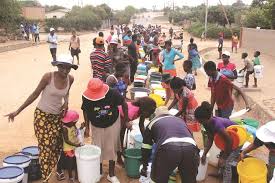Bulawayo City Council (BCC) has been urged to come up with modalities that favour people living with disabilities (PLWDs) as they continue to face challenges in accessing water at the alternative water sources such as boreholes and bowsers.
The City is currently facing a water crisis with residents going for weeks without water owing to several years of drought and poor rains
This has forced some residents especially in western suburbs to dig up wells to get water.
Speaking during a virtual meeting held by Bulawayo Progressive Residents Association (BPRA) on Wednesday to understand water challenges faced by women, young people and people with disabilities, Sukoluhle Mhlanga representing PLWDs said the existing water sources do not cater for them.
“The ongoing water situation has affected us people with disability especially during this Covid-19 era, the alternative water sources are not disability friendly,” said Mhlanga.
“Giving examples from Cowdray Park where there are limited boreholes, we can’t access them, we rely mostly on wells where we also depend on good Samaritans to assist us there.
Mhlanga noted that the Covid-19 has worsened the situation of PLWDs.
“When we get to those wells some people ask why we fetch water for ourselves instead of relying on other people to fetch for us, but you realise that for a disabled woman living with children, those children would have gone somewhere maybe to sell, then the mother remains alone with no one to fetch water for her,” she said.
Mhlanga also urged the local authority to adhere to its water supply schedule.
Meanwhile, Keith Sibanda said the alternative sources are generally not easily accessible by residents.
“In as much as we are in a crisis, BCC alternative water sources are not accessible to even people without disabilities, BCC is inconsiderate and doesn’t care for people with disabilities,” said Sibanda.
He said young people are also affected by the ongoing water crisis.
“Young people are the most affected, from the early hours around 6am for example in areas around White City, young people now spend most of their time looking for water as if they no longer have other things to do. Its traumatic especially for a girl child who has to go through menstrual cycle and need water for hygiene,” he said.
Grascious Maviza, a researcher at the National University of Science and Technology (NUST) said they conducted a research with BPRA and noted that water situation is generally a burden to women.
“Right now it’s a scenario of going a long distance trying to get water, while they do that some have to push a wheelbarrow while a significant number carry them on their head linking that to a rural setting and we asked if that has no health effect to women,” said Maviza.
“Water challenges have affected economic production as some women are in the cross border business while others are vendors, their livelihoods are at stake as it has increased dependency on men.”
She said women are disproportionately affected by water challenges as alternative water sources exposes them to other diseases such as Covid-19.

